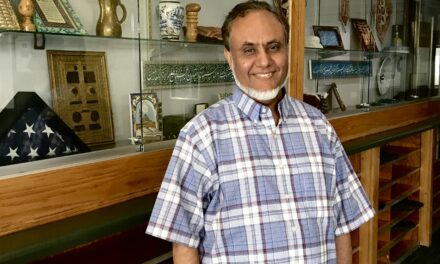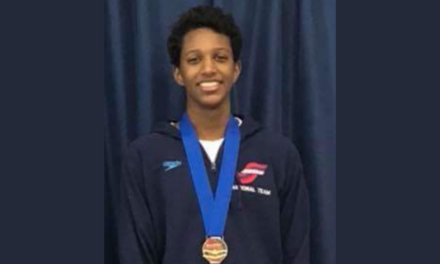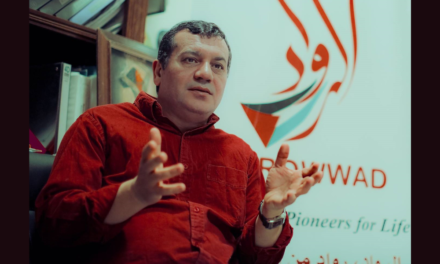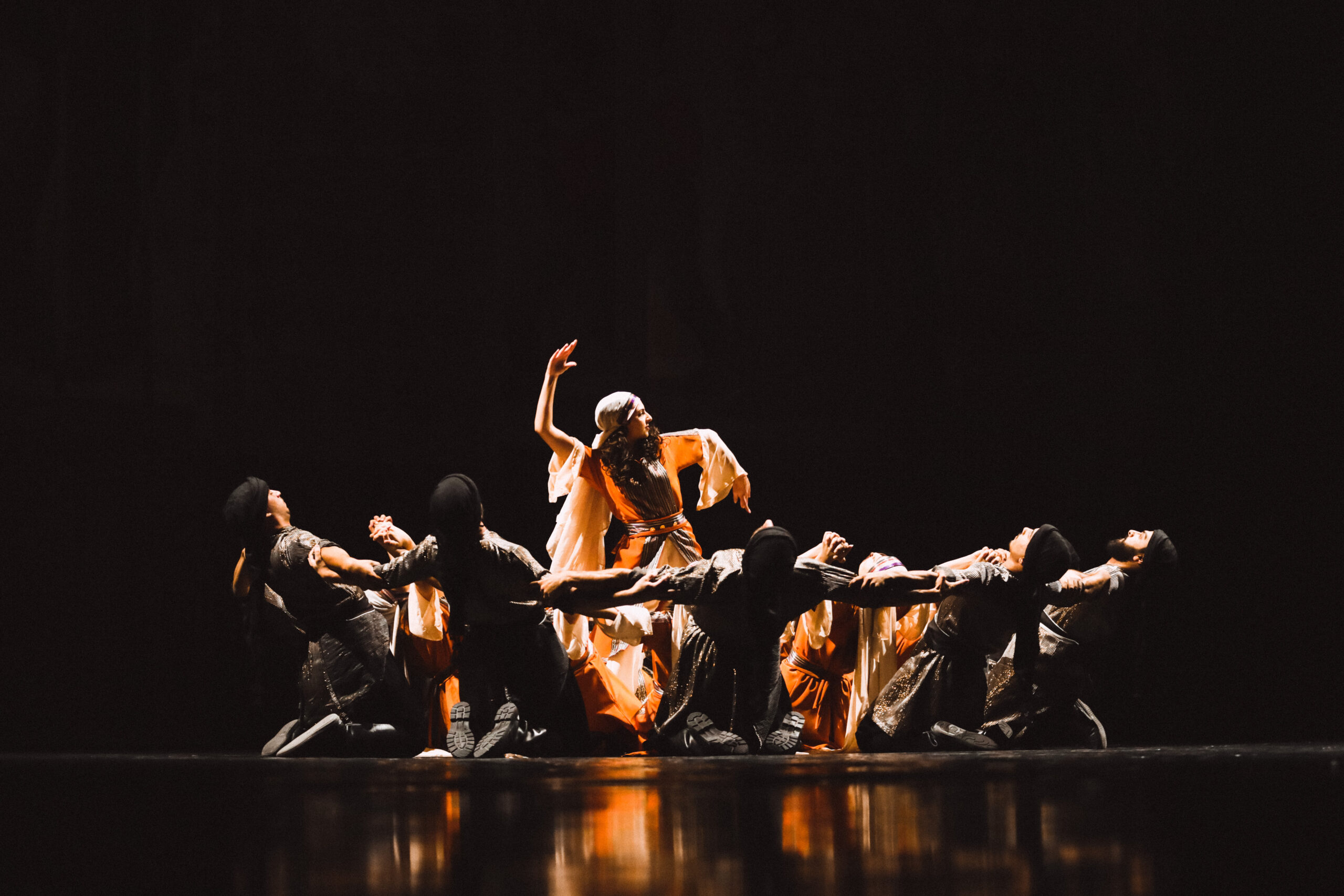
Photo courtesy of of the U.S. Palestinian Community Network
Wishah Dance Troupe uses traditional debke to tell stories of the Palestinian people’s daily life in the occupied territories.
U.S. Palestinian Community Network is bringing two acclaimed Palestinian dabke troupes to the U.S. for a 12-day tour, including two performances in Wisconsin.
Wishah and Baladi, popular ensembles from the West Bank, will perform Sunday, Sept. 7, in Oak Creek and Monday, Sept. 8, in Madison. From Rubble We Dance Tour will also perform in Detroit and Flint, Michigan; Toledo and Cleveland, Ohio, and participate in a community event in Youngstown.
“Wishah and Baladi’s performances are a living archive of Palestinian resistance,” said a spokesperson for the People’s Conference for Palestine, which will take place in Detroit, Aug. 29-31, and where the dancers launch their tour. “Dabke dance carries the stories of our people: of land, exile, return, and steadfastness. In the face of genocide and erasure, we preserve and celebrate Palestinian culture and heritage in the face of efforts to erase or diminish it.”
All proceeds from the performances will go to Middle East Children’s Alliance, a nonprofit humanitarian aid organization that works to protect the rights and improve the lives of children in the Middle East. Beyond paying expenses of travel and accommodations, the dancers are not paid, Salawdeh said. They have chosen to contribute their performances so more money can go directly to helping children in Gaza, he said. USPCN organizers are also working as volunteers.
“Our community has once again shown its generosity and its willingness to support our brothers and sisters back home,” said Haitham Salawdeh of Wauwatosa, USPCN national treasurer and Milwaukee chapter co-chair. “We have guaranteed the cost of the venue and the troupe through generous sponsorships.
“Every dollar we raise going forward will be going to Gaza,” he said. “We will continue to ask for sponsorships and sell tickets because our compass is Gaza and our eye is on Palestine.”
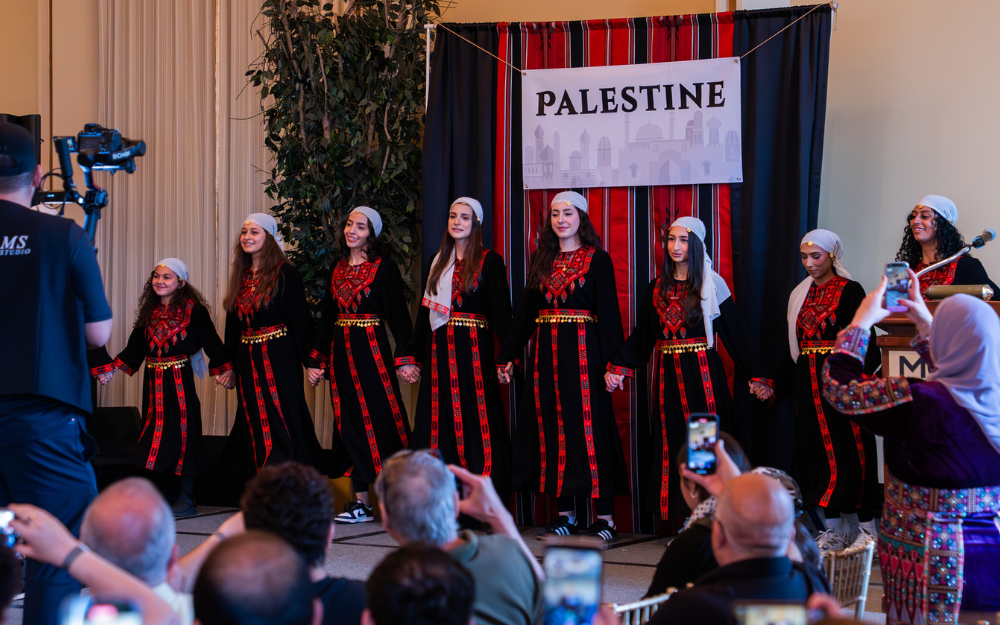
Photo by Elhadi Mohamed
Milwaukee’s new all female dabke troupe, Banat al-Huriyah, will perform as the opening act for the show in Oak Creek.
Tickets available now for Wisconsin performances
“Join us for a night of tradition that refuses to be buried,” says USPCN’s flier for the From Rubble We Dance tour.
USPCN expects a big turn-out, especially for the Oak Creek performance. “It’s a big venue that seats almost 1,000 people located near southeastern Wisconsin’s large Arab community,” Salawdeh said. “It’s beautiful and new, just opened in 2020.”
Milwaukee’s Banat Al Huriyah will open at the Oak Creek performance. The new dabke group for women and girls debuted at Celebrating Palestine, a cultural festival organized by the Muslim Women’s Coalition and held at the Marcus Performing Arts Center in Milwaukee in June.
Madison-Rafah Sister City Project is partnering with USPCN to present the From Rubble We Dance Tour in Madison. The local volunteer organization is “committed to standing with the people of Gaza and Palestine as they struggle to remain in their homeland despite Israel’s decades long settler-colonial occupation of the West Bank and brutal blockade and Genocide in Gaza,” its press release said.
At both the Oak Creek and Madison performances, various vendors will sell Palestinian embroidery, kufiyahs and solidarity items before the shows. Doors open an hour before each performance to allow audience members to visit vendor tables. Wisconsin performances include:
- Sunday, Sept. 7, 6 p.m. at the Oak Creek Performing Arts & Education Center, 340 E. Puetz Rd. (Doors open at 5 p.m.)
– Tickets from $50 to $100, plus a “pay as you can” $25 option
– Donations to Middle East Children’s Alliance can be made when purchasing tickets.
– Purchase tickets to Oak Creek performance here. - Monday, Sept. 8, 7 p.m. at the Bartell Theatre, 113 E. Mifflin St., Madison. (Doors open at 6:15 p.m.)
– General admission tickets are $30.
– Purchase tickets to Madison performance here.
USPCN: Advocates for Palestine
“We all want to do something for Gaza,” said Salawdeh, an early member and leader in the national USPCN. “We feel like it’s an opportunity to assert our cultural heritage and history, as well as to raise funds for Gaza.”
Before the COVID pandemic, USPCN regularly hosted events to support Palestinians and the Palestinian cause. “COVID just about stopped our events,” he said. One exception was a six-city, six-day U.S. tour commemorating the 75th anniversary of the Nakba, the expulsion of Palestinians from their homeland in 1948 that featured Nelson Mandela’s grandson Nkosi Zwelivelile Mandela, an outspoken activist against oppression.

Haitham Salawdeh of Wauwatosa serves as USPCN national treasurer and as the Milwaukee chapter’s co-chair.
“From Rubble We Dance is a comeback,” Salawdeh said. “This is what we do—we raise funds, educate people and hit the streets in demonstrations. We organize and educate our community, as part of a large Palestinian community, where we are not separated from our homeland. We are not just in solidarity with our people in Palestine; we are part of the fight. This is our cause and we have to lead it.”
USPCN started in 2006, “almost 20 years ago, in the post-Sept. 11 era,” he noted. “The hope was to get our community back to being organized and not to fear being advocates for our cause—the liberation of Arab land, the right of return of Palestinian refugees and freedom of all people from Israeli occupation.”
Salawdeh joined USPCN in 2007 and helped organize its first conference, held in Chicago in 2008. Today the organization has chapters across the U.S.— Los Angeles, the Bay Area, Chicago, Youngstown, Cleveland, Milwaukee, Madison, Houston, Detroit/Dearborn, New York and Washington, D.C.
Over the years, “we brought Wishah for fundraisers about six times,” Salawdeh said. They performed in Milwaukee in 2015 to raise money for the Dawabsha family of Duma, whose 18-month-old son was burnt alive in a firebombing of their West Bank home by Israeli settler extremists. His parents soon also perished from their burns. Only 4-year-old Ahmad survived,” he said.
“Ahmad, who is now about 15 years old, has a life expectancy of 19 or 20, given the amount of loss to his skin and organs from the fire,” Salawdeh said. “He has moved from hospital to hospital. We raised money for his medication and treatment.
“We wanted to bring Wishah again this year. They applied for visas based on the invitations we sent them. The State Department refused about half the visas. Since half of their troupe couldn’t come, they collaborated with another troupe, Baladi. Baladi has some members who are either American or Canadian citizens so they were able to come to the States. The two groups collaborated together to make this tour happen.
“They love to perform for Palestinian audiences in the diaspora. For us, it connects us back to home. For them it’s an opportunity to see the community outside of Palestine still being engaged. That gives them a lot of hope and a lot of encouragement.”
A worthy cause
“Over the years, we have constantly raised money for Palestinian aid organizations and the Middle East Children’s Alliance is at the top of our list,” Salawdeh said. “MECA was co-founded in 1988 by journalist Howard Levine and Barbara Lubin, who was nominated for a Nobel Peace Prize in the 1990s. She is a Jewish American who recognized what is being done in her name and became a great advocate for the Palestinians and other refugees in the Middle East.”
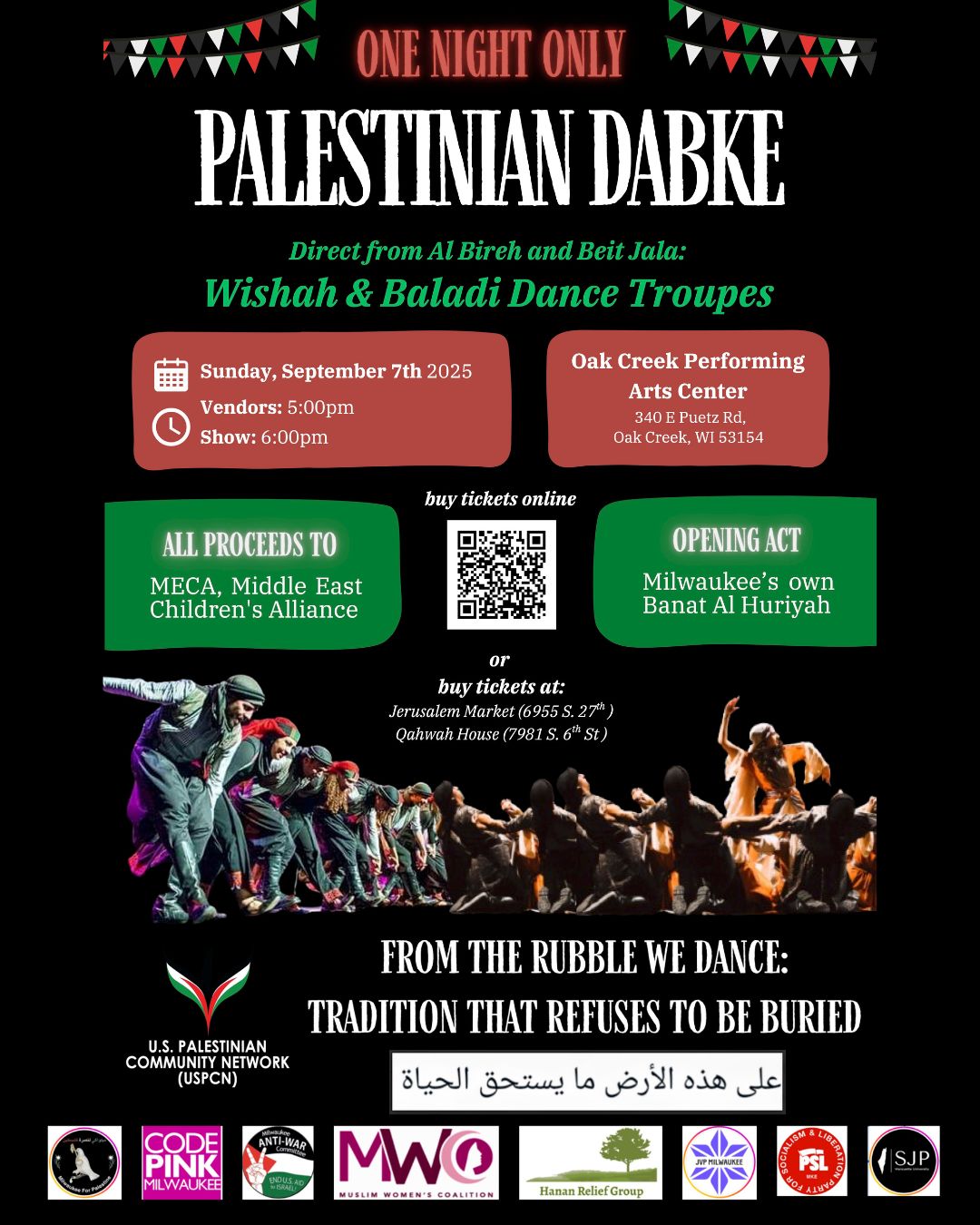
“In Gaza, they ran a hospital for years, which is now, of course, destroyed,” he said. “But they still have staff on the ground, treating people from tents and distributing food, sanitation products and medicine.”
Since its founding, MECA has shipped millions of dollars’ worth of food, medical supplies and art supplies to children in war-torn Iraq, Syria, Lebanon and Palestine, says UTNE Reader, which named Lubin an Unte Visionary in 2012. On that occasion, she explained in an interview that she grew up “in a very right-wing Zionist home. We supported the policies of the State of Israel blindly.” After she was elected to the board of education in Berkeley, California, a group of college students “came to see me … little by little … educated me and made me realize what was really happening.”
When the first intifada began, Lubin took a delegation of locally elected officials from around the U.S. “It was that trip and really those young students who really made me understand what was happening and changed the whole way I look at this issue.”
Two months after her return, Lubin and Levine founded MECA. Since then, they’ve sent food and medicine to children, built playgrounds, preschools and kindergartens, libraries and parks, medical clinics and counseling centers, funded university scholarships and supported sports, dance and “doing this work around the clock.”
